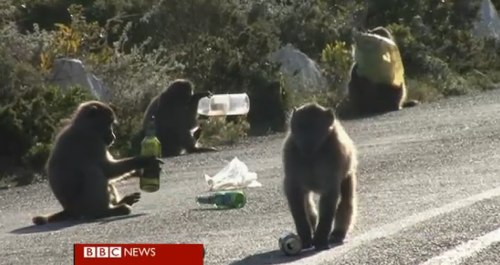Posted by Justin on September 1st, 2010
A crimson rainfall in India at the turn of our most recent century has been rumored to feature properties that we’ve never seen on Earth before or since. New research demonstrates that the cells of the rain can replicate in extremely hostile environments. The results also suggest that the rain might have originated in extragalactic dust clouds.
This only ends one of two ways. 1) the rain creates the zombie disease outbreak which changes our lives (and since it will be local to India: Bollywood films) forever 2) this is the first sign of the coming of Galactus.
[arxiv.org via Kurzweil]
Posted in Aliens, Space | |
Comments (1)
Posted by Justin on September 1st, 2010

Well… duh.
Other theories (notably less awesome than an all powerful, semi-emo superman) include an “oblique impact, when a small body struck the surface at a very shallow angle.”
Boring.
[Pop Sci]
Posted in Mars | |
Comments (1)
Posted by Justin on August 31st, 2010
Thanks to Weird Things reader Dan Wheeler for sending this in.
Posted in Insane | |
Comments (1)
Posted by Justin on August 31st, 2010

The oldest known shaman died and was buried in a Northern Israeli cave. Everyone thought it would be a good idea to stuff their faces with food in her memory. Because of this, you ate a ham plate at your Uncle Barry’s wake.
Life is strange.
A study published Monday in the journal Proceedings of the National Academy of Sciences by Grosman and Natalie Munro, a zooarchaeologist at the University of Connecticut, reveals that the shaman’s burial feast was just one chapter in the intense ritual life of the Natufians, the first known people on Earth to give up nomadic living and settle in villages.
The other traditions? Carried the dead bodies along with the party supplies up the mountains to their elevated resting places. Who’s got two thumbs and is pretty psyched we dropped that one?
[Nat Geo]
Posted in Ancient Civilizations | |
Comments (2)
Posted by Justin on August 27th, 2010
So your kindly grandfather makes it a point every Thanksgiving to spook the kids with a little ghost story. Back in 1832, he’d say whilst wiping the remains of cranberry sauce from his white button down, 57 Irish immigrant railroad workers were murdered and buried in a spooky old spot by the rail road tracks called Duffy’s Cut.
Fat on stuffing, everyone would shuffle home, wondering why grandfather kept telling that story on Thanksgiving instead of Halloween.
Timing aside, it turns out that story wasn’t so much as a spook tale meant to give the youngins nightmares as it was a grisly confession that he had proof of a few dozen murders. Now a pair of twin grandsons are spearheading a project to dig up the bodies and find the truth.
Oh grandpa…
Posted in Murder | |
Comments (1)
Posted by Justin on August 27th, 2010

A letter found in the ruins of a collapsed Spanish colonial church in Peru could be the key to a heretofore undiscovered language. Awesome.
“Even though [the letter] doesn’t tell us a whole lot, it does tell us about a language that is very different from anything we’ve ever known—and it suggests that there may be a lot more out there,” said project leader Jeffrey Quilter, an archaeologist at Harvard’s Peabody Museum of Archaeology and Ethnology.
The letter was preserved because the caved in structure protected the relatively unharmed library and offices of the facility.
[Nat Geo]
Posted in Ancient Civilizations | |
Comments (1)
Posted by Justin on August 27th, 2010

Stop me when you’ve heard this one. A Thai national is trying to smuggle a two-month old tiger cub to Iran, so she drugs the cute little buggers and tosses them into a carry on bag filled with stuffed tigers so as to throw off security.
And then she’s arrested.
You hadn’t heard it? Okay, well now you have.
[Nat Geo]
Posted in Big Cats | |
Comments (2)
Posted by Justin on August 26th, 2010

Researchers have found that Mayans protected their drinking water by installing a layer of ceramic shards. Pretty crafty…
If so, that would be a minor sensation — merely due to the quantity of ceramics required. The aguadas in Uxul were each as large as ten Olympic-size pools. Maybe there used to be even more artificial lakes. After all, the precious commodity had to be enough to last a population of at least 2,000 through the 3-month dry season.
Mayans! What will they have thought of next!
Posted in Ancient Civilizations | |
Comments (2)
Posted by Justin on August 25th, 2010

The dream is real! Marty McFly’s self-lacing shoes could become science fact as Nike filed a patent for the tech in 2009.
[Nice Kicks]
Posted in Awesome | |
Comments (1)
Posted by Justin on August 25th, 2010

Cut off from nature! Fenced in by the sea! The only recourse? Rob the humans blind! This summer… they’re not monkeying around. They are South African Baboon Thieves!
[BBC]
Posted in Baboons | |
Comments (1)
Posted by Justin on August 25th, 2010
Okay, it’s really the most detailed picture of a sun spot ever taken. Still…
[Pop Sci]
Posted in Evil, Sun | |
Comments (2)
Posted by Justin on August 24th, 2010

Is the secret X-37B space plane going rogue? Or is this part of the plan for the Air Force’s mystery vessel?
Either way, amateur sky watchers found the reusable space plane had boosted itself into a different orbit last week. This might be because it will now come into contact with a few Air Force Satellite Control Network facilities it would not have otherwise. Or because someone got bored. Since the military is disclosing any details, we have no way of knowing.
No landing date for the X-37B has been set.
[Space]
Posted in Conspiracy | |
Comments Off on Amateurs Inform Air Force Secret Space Plane Changed Orbit
Posted by Justin on August 24th, 2010

A work crew in Edmonton found a huge dinosaur bone while working in a sewer tunnel. What’s amazing is not necessarily the discovery, but the cavalier attitude held by the museum official the crew turned the fossil over to.
Museum officials say finding dinosaur bones in Canada’s Alberta province is a relatively common occurrence.
“I can go out on a hike on a Sunday and find a dinosaur bone. But it’s really a question of how significant the find is,” said Leanna Mohan, the museum’s marketing coordinator.
Okay Indiana Jones, calm down. Let’s not go crapping all over the coolest thing to happen these guys since Larry slipped face first into a pile of human waste because he was trying to reenact a CFL touchdown dance.
Besides, what if it’s weirder than that? Ever seen that movie Relic? What if that monster ate a real dinosaur in the sewer.
It’s early.
[BBC]
Posted in Uncategorized | |
Comments (1)
Posted by Justin on August 23rd, 2010

How did folks describe UFO phenomenon before we had the science fiction constructs to fill in the blanks of interstellar travelers from deep space? Probably a lot like 12-year-old George Campbell of Sherman, Texas in 1898.
“Last night papa and I were riding along the ‘Eighty-foot Road’, about two and a half miles [4km] north of town, when all at once everything got very bright. We saw a great ball of fire coming down toward the ground. It got within about three feet [90cm] of the ground and seemed to rest for a while and then it went back up until it got clear out of sight. There was a buzzing sound all the time.”
George described the ball as 10 feet wide and not emitting any heat.
[Fortean Times]
Posted in Bizarre, UFO | |
Comments (1)
Posted by Editor on August 22nd, 2010

The trio discuss how polite you should be at a dinner part that goes horrifically awry. They then offer some practical advice in dealing with an impending mole people invasion.
Subscribe to the Weird Things podcast on iTunes
Podcast RSS feed
Episode archive
Download url: http://www.itricks.com/upload/WeirdThings081310.mp3
Blurbtastic!
[podcast]http://www.itricks.com/upload/WeirdThings081310.mp3[/podcast]
Posted in Podcast, Podcasts | |
Comments (4)
Posted by Justin on August 22nd, 2010
Posted in WeirdThingsTV | |
Comments (5)











